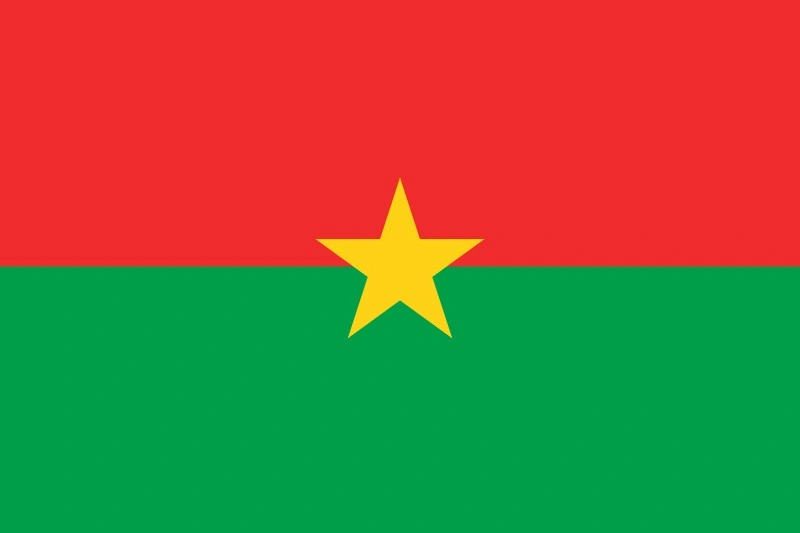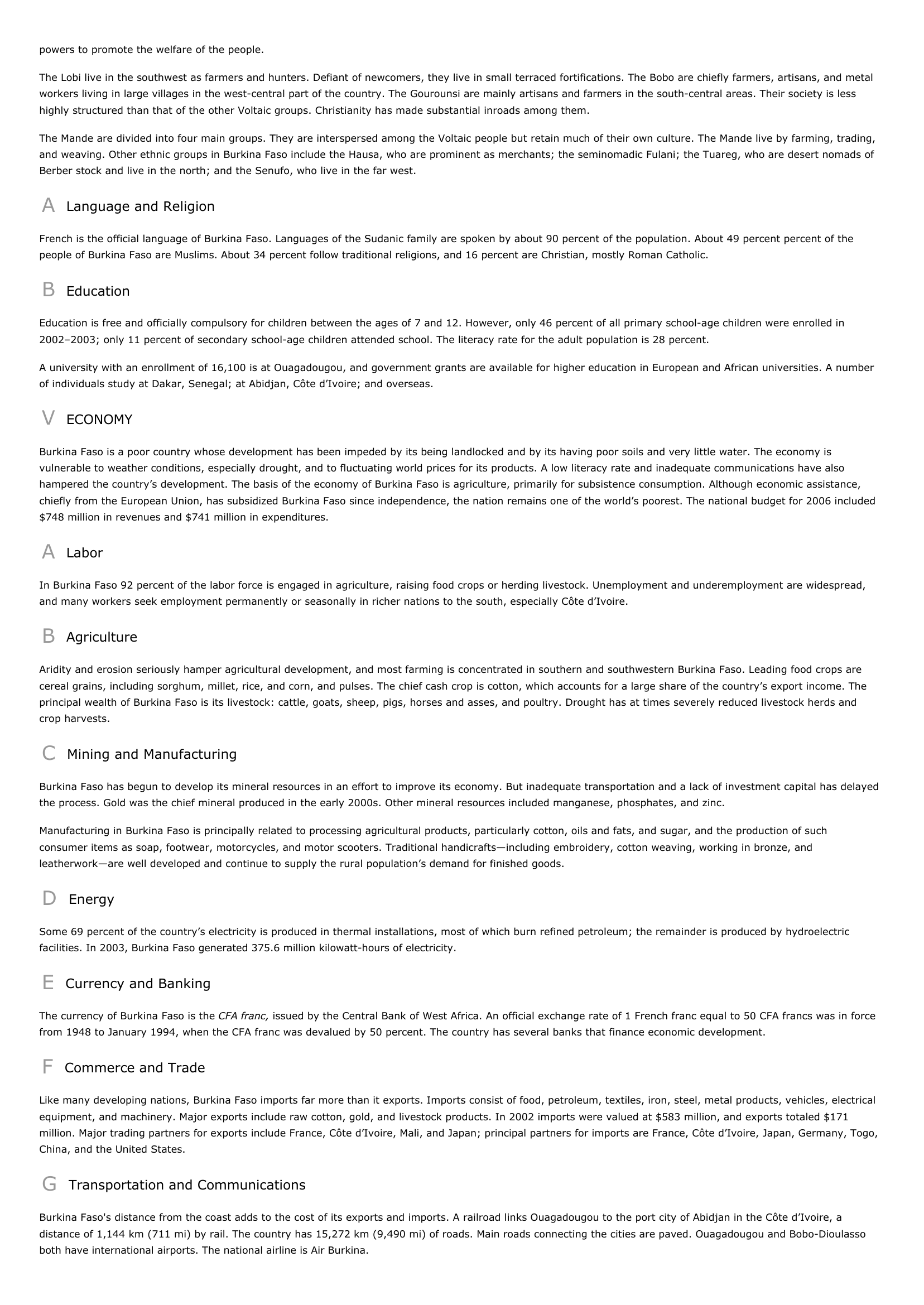Burkina Faso - country.
Publié le 04/05/2013
Extrait du document


«
powers to promote the welfare of the people.
The Lobi live in the southwest as farmers and hunters.
Defiant of newcomers, they live in small terraced fortifications.
The Bobo are chiefly farmers, artisans, and metalworkers living in large villages in the west-central part of the country.
The Gourounsi are mainly artisans and farmers in the south-central areas.
Their society is lesshighly structured than that of the other Voltaic groups.
Christianity has made substantial inroads among them.
The Mande are divided into four main groups.
They are interspersed among the Voltaic people but retain much of their own culture.
The Mande live by farming, trading,and weaving.
Other ethnic groups in Burkina Faso include the Hausa, who are prominent as merchants; the seminomadic Fulani; the Tuareg, who are desert nomads ofBerber stock and live in the north; and the Senufo, who live in the far west.
A Language and Religion
French is the official language of Burkina Faso.
Languages of the Sudanic family are spoken by about 90 percent of the population.
About 49 percent percent of thepeople of Burkina Faso are Muslims.
About 34 percent follow traditional religions, and 16 percent are Christian, mostly Roman Catholic.
B Education
Education is free and officially compulsory for children between the ages of 7 and 12.
However, only 46 percent of all primary school-age children were enrolled in2002–2003; only 11 percent of secondary school-age children attended school.
The literacy rate for the adult population is 28 percent.
A university with an enrollment of 16,100 is at Ouagadougou, and government grants are available for higher education in European and African universities.
A numberof individuals study at Dakar, Senegal; at Abidjan, Côte d’Ivoire; and overseas.
V ECONOMY
Burkina Faso is a poor country whose development has been impeded by its being landlocked and by its having poor soils and very little water.
The economy isvulnerable to weather conditions, especially drought, and to fluctuating world prices for its products.
A low literacy rate and inadequate communications have alsohampered the country’s development.
The basis of the economy of Burkina Faso is agriculture, primarily for subsistence consumption.
Although economic assistance,chiefly from the European Union, has subsidized Burkina Faso since independence, the nation remains one of the world’s poorest.
The national budget for 2006 included$748 million in revenues and $741 million in expenditures.
A Labor
In Burkina Faso 92 percent of the labor force is engaged in agriculture, raising food crops or herding livestock.
Unemployment and underemployment are widespread,and many workers seek employment permanently or seasonally in richer nations to the south, especially Côte d’Ivoire.
B Agriculture
Aridity and erosion seriously hamper agricultural development, and most farming is concentrated in southern and southwestern Burkina Faso.
Leading food crops arecereal grains, including sorghum, millet, rice, and corn, and pulses.
The chief cash crop is cotton, which accounts for a large share of the country’s export income.
Theprincipal wealth of Burkina Faso is its livestock: cattle, goats, sheep, pigs, horses and asses, and poultry.
Drought has at times severely reduced livestock herds andcrop harvests.
C Mining and Manufacturing
Burkina Faso has begun to develop its mineral resources in an effort to improve its economy.
But inadequate transportation and a lack of investment capital has delayedthe process.
Gold was the chief mineral produced in the early 2000s.
Other mineral resources included manganese, phosphates, and zinc.
Manufacturing in Burkina Faso is principally related to processing agricultural products, particularly cotton, oils and fats, and sugar, and the production of suchconsumer items as soap, footwear, motorcycles, and motor scooters.
Traditional handicrafts—including embroidery, cotton weaving, working in bronze, andleatherwork—are well developed and continue to supply the rural population’s demand for finished goods.
D Energy
Some 69 percent of the country’s electricity is produced in thermal installations, most of which burn refined petroleum; the remainder is produced by hydroelectricfacilities.
In 2003, Burkina Faso generated 375.6 million kilowatt-hours of electricity.
E Currency and Banking
The currency of Burkina Faso is the CFA franc, issued by the Central Bank of West Africa.
An official exchange rate of 1 French franc equal to 50 CFA francs was in force from 1948 to January 1994, when the CFA franc was devalued by 50 percent.
The country has several banks that finance economic development.
F Commerce and Trade
Like many developing nations, Burkina Faso imports far more than it exports.
Imports consist of food, petroleum, textiles, iron, steel, metal products, vehicles, electricalequipment, and machinery.
Major exports include raw cotton, gold, and livestock products.
In 2002 imports were valued at $583 million, and exports totaled $171million.
Major trading partners for exports include France, Côte d’Ivoire, Mali, and Japan; principal partners for imports are France, Côte d’Ivoire, Japan, Germany, Togo,China, and the United States.
G Transportation and Communications
Burkina Faso's distance from the coast adds to the cost of its exports and imports.
A railroad links Ouagadougou to the port city of Abidjan in the Côte d’Ivoire, adistance of 1,144 km (711 mi) by rail.
The country has 15,272 km (9,490 mi) of roads.
Main roads connecting the cities are paved.
Ouagadougou and Bobo-Dioulassoboth have international airports.
The national airline is Air Burkina..
»
↓↓↓ APERÇU DU DOCUMENT ↓↓↓
Liens utiles
- Ouedraogo Idrissa, né en 1952 à Banfora (Burkina Faso), cinéaste burkinabé.
- Principales divisiones políticas de África UNIDAD POLÍTICA RÉGIMEN POLÍTICO Argelia República Angola República Benín República Botsuana República Burkina Faso República Burundi República Camerún República Canarias Comunidad autónoma española Cabo Verde República Centroafricana, República República Chad República Comores República Congo,
- Burkina Faso - geographie.
- Compaore Blaise, né en 1951, homme d'État du Burkina Faso.
- Burkina Faso.

































